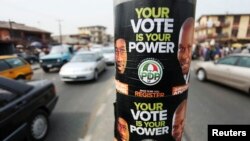ABUJA —
Nigeria's electoral commission has approved the merger of three main opposition parties into a bloc that could pose the most credible threat yet to the long-ruling party of President Goodluck Jonathan.
Since nearly three decades of military dictatorship ended in 1999, the People's Democratic Party (PDP) has ruled more or less unchallenged, winning every presidential poll.
But recent internal wrangling has weakened it, and the coalition of the Action Congress of Nigeria (ACN), All Nigeria People's Party (ANPP) and Congress of Progressive Change (CPC) is better funded and organized than any previous opponent.
“The Independent National Electoral Commission has approved the application by three political parties — the ACN, ANPP and CPC — to merge into one, to be known as the All Progressive Congress,” the commission said in a statement.
A fourth party, the APGA, was also supposed to join to coalition, but it has yet to submit an application.
The PDP controls around two thirds of Nigeria's states and has a majority in both houses of the national assembly. But it is deeply divided over Jonathan's assumed intention to run for office again in 2015, a debate which has dominated politics at the expense of urgently needed economic reforms.
More than half of Nigeria's governors and a number of lawmakers are in revolt against Jonathan over the issue, especially northerners who felt that his running in 2011 violated an unwritten agreement to rotate power between the largely Muslim north and mostly Christian south every two terms.
Analysts say it remains to be seen whether the opposition coalition — largely a patchwork of competing interests from the north and the predominantly ethnic Yoruba southwest around the commercial hub of Lagos — can hold together.
Its two main figures — former northern military ruler Mohammadu Buhari and former Lagos state governor Bola Tinubu — are both powerful personalities on either side of the north-south divide. They will have to agree on a candidate for the 2015 presidential poll.
Most analysts expect a Muslim northern candidate to emerge with a southern Christian running mate for vice president.
The more closely fought an election in Africa's leading energy producer, the more violent it could be, analysts say.
Previous elections have been marred by violence, especially in constituencies that were hotly contested. More than 500 people were killed in post-election rioting in April 2011, after youths in northern towns erupted into protest over Jonathan's victory.
Since nearly three decades of military dictatorship ended in 1999, the People's Democratic Party (PDP) has ruled more or less unchallenged, winning every presidential poll.
But recent internal wrangling has weakened it, and the coalition of the Action Congress of Nigeria (ACN), All Nigeria People's Party (ANPP) and Congress of Progressive Change (CPC) is better funded and organized than any previous opponent.
“The Independent National Electoral Commission has approved the application by three political parties — the ACN, ANPP and CPC — to merge into one, to be known as the All Progressive Congress,” the commission said in a statement.
A fourth party, the APGA, was also supposed to join to coalition, but it has yet to submit an application.
The PDP controls around two thirds of Nigeria's states and has a majority in both houses of the national assembly. But it is deeply divided over Jonathan's assumed intention to run for office again in 2015, a debate which has dominated politics at the expense of urgently needed economic reforms.
More than half of Nigeria's governors and a number of lawmakers are in revolt against Jonathan over the issue, especially northerners who felt that his running in 2011 violated an unwritten agreement to rotate power between the largely Muslim north and mostly Christian south every two terms.
Analysts say it remains to be seen whether the opposition coalition — largely a patchwork of competing interests from the north and the predominantly ethnic Yoruba southwest around the commercial hub of Lagos — can hold together.
Its two main figures — former northern military ruler Mohammadu Buhari and former Lagos state governor Bola Tinubu — are both powerful personalities on either side of the north-south divide. They will have to agree on a candidate for the 2015 presidential poll.
Most analysts expect a Muslim northern candidate to emerge with a southern Christian running mate for vice president.
The more closely fought an election in Africa's leading energy producer, the more violent it could be, analysts say.
Previous elections have been marred by violence, especially in constituencies that were hotly contested. More than 500 people were killed in post-election rioting in April 2011, after youths in northern towns erupted into protest over Jonathan's victory.
